Nigeria’s February 2024 Inflation: Rubbing Shoulders with the Past

“Life today is nothing more than a collection of results of the choices you have made”. – Robert Schuller
Inflation has persisted as a problem in Nigeria. Households have had their incomes decimated, peace disrupted, and stability shaken. The average household looks like a dog beaten on a rainy day. The forlorn look in the eyes of regular breadwinners portrays the damage that rising consumer prices have had on household well-being. The 31.7% inflation announcement by the National Bureau of Statistics (NBS) for February 2024 revealed what everybody already knew: Nigeria’s inflation is on the warpath. Rising from 29.9% in January, inflation has hunted for the soul of the Nigerian consumer’s wallet.
NBS data shows that the Nigerian inflation rate has continued a 14-month rise, suggesting a blizzard on the finances of most households and the destruction of the real value of the pension incomes of workers. Going old in Nigeria is gradually becoming a crime as inflation wipes out the benefits of long-term investments; one pensioner recently noted that ‘living the wildlife was once considered extremely reckless, but with inflation capable of wiping out 50% of the value of one’s financial egg nest in two and a half years. Maybe Keynes, the economist, was right when he said in the long run, we are all dead!’
According to the retiree, ‘You look at the few millions in your pension fund account at age 65, and you continue to ask yourself, how far will this take me?’ With inflation ravaging and chewing up nominal incomes for breakfast, the question is valid even if difficult to answer.
Not only pensioners but also savers are having a rocky time. Young Nigerians trying to build rainy-day funds find the habit worse than being on a treadmill going nowhere fast. The more they save, the more inflation takes. The inconvenient truth is that though the government may claim concern about inflation, it may not really mean what it says. Inflation is nasty, but it is a great way to tax everyone. For example, a federal government (FGN) bond issued on March 8, 2024, with a maturity date of March 13, 2027, has a coupon of 16.09%. Measured against the contemporary inflation rate, the government pledges to pay back investors’ money in 3 years, paying N16 on every N100 borrowed; however, if inflation remains above 30% or 25% on average, the government has wiped out the interest on the investment and eaten into the investors original capital, thus the ‘tax’. In other words, ‘The Richest Man in Babylon’ story by George Clayson is brilliant, but in an environment of raging inflation, it is a fool’s game, with the fool being the saver. For the investor? That may be a different conversation, depending on the investment. The NBS’s February 2024 inflation rate numbers throw up seven key insights.
7 Key insights from the January 2024 Inflation report
- The 2024 February inflation rise is the 14th consecutive increase in the inflation rate in Nigeria since January 2023.
- Southwest Nigeria had the highest Headline inflation in February 2024, while the South-South region of Nigeria has the highest food inflation.
- Headline and food inflation were lowest in the northeast region of Nigeria.
- Kogi state has had the highest headline inflation in the past three months, while Bornu state has had the lowest.
- Kogi state has had the highest food inflation in the past three months, while Bauchi state has had the lowest.
- Plateau, Taraba, Nasarawa, and Bornu have consistently had the lowest headline inflation and food prices in the past three months.
- Lagos state dropped from the top ten states with the highest inflation in February 2024.
7 Key Highlights from the January 2024 Inflation Report
- Inflation increased by 9.79% points year-on-year (year-on-year) to 31.70% in February 2024 from 21.82% points in February 2023.
- Inflation rose by 1.80% points Month-on-month (M-o-M), from 29.90% in January 2024 to 31.70% in February 2024.
- Core inflation rose from 18.37% in February 2023 to 25.13% in February 2024.
- Inflation remains higher in urban areas at 33.66% in February 2024 from 16.25% in February 2023 than in rural areas at 29.99% in February 2024 from 21.10% in February 2023.
- Food inflation rose by 13.57% points to 37.92% in February 2024, up from 24.35% in February 2023.
- Kogi state had the highest headline inflation growth at 37.99% in February 2024, while Borno had the lowest inflation growth at 31.46%.
- Food inflation growth was highest in Kogi at 44.18% in January 2024, while Bauchi had the lowest food inflation at 28.83% in January 2024(see table below).
Table 1:
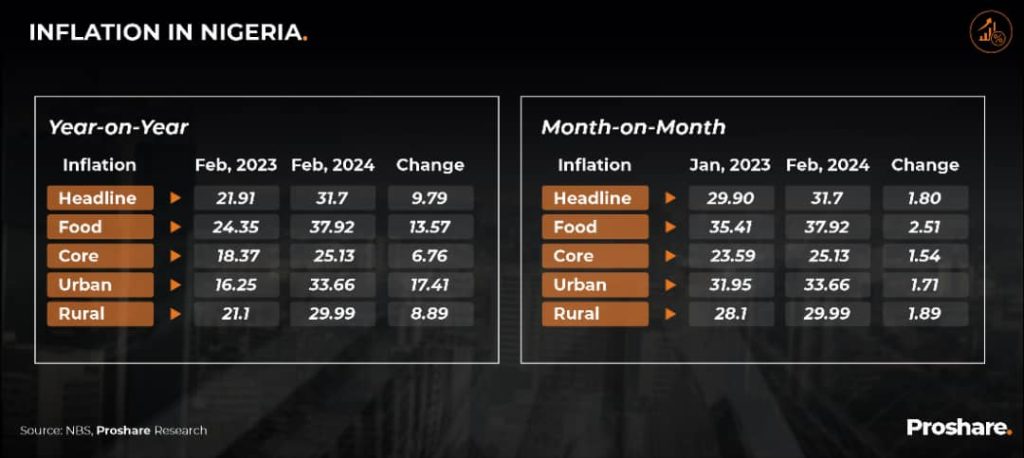
Inflation Across Regions in Nigeria
The Southwest overtook the South-South as the region with the highest inflation. In the northern region, the north-central region with the highest insecurity crisis had the highest inflation in February 2024 (see chart below).
Chart 1:
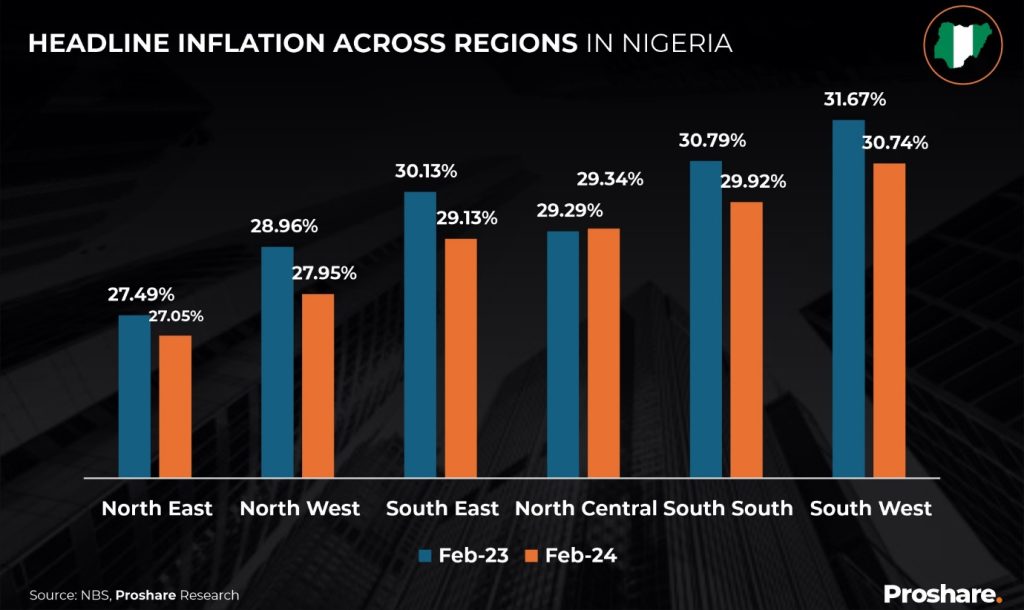
Recent data suggest the need to boost food production in the southern region of Nigeria, which continues to have the highest food inflation and remains reliant on food from the north. The northern regions have relatively lower but still very high food inflation, which is a pass-through to the southern region’s food inflation (see chart below).
Chart 2:
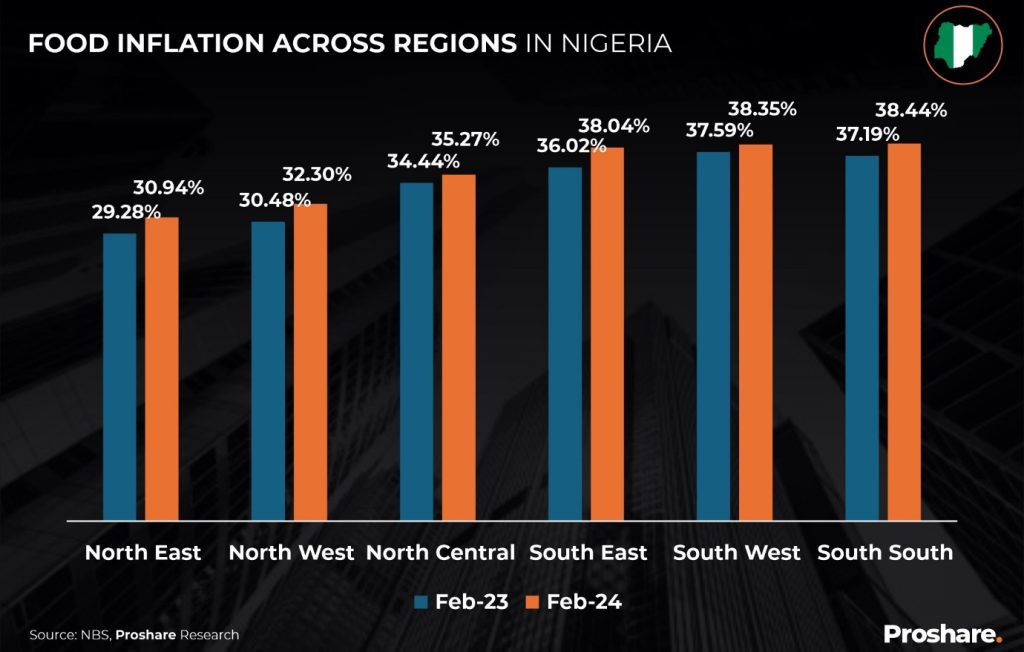
Inflation in Nigerian States: What is happening in Kogi State?
Headline inflation in Nigerian States
Kogi State has had the highest headline inflation in the past three months. Oyo, Bauchi, Rivers, Osun, Ebonyi, Ondo, and Akwa Ibom have featured at least twice among states with the highest inflation in the past three months (see illustration below).
Table 2:
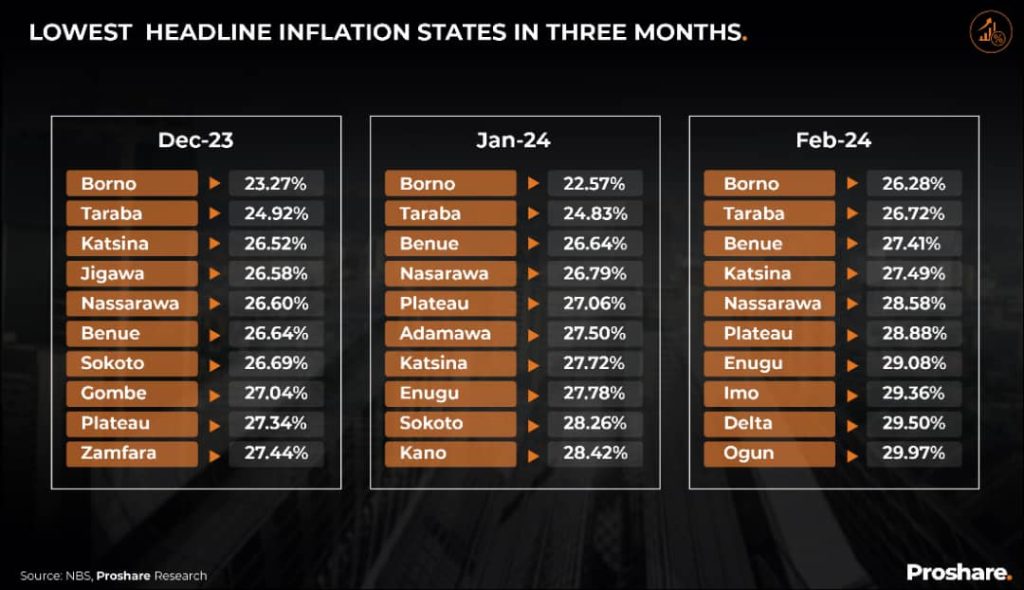
Bornu State remains the state with lowest headline inflation in three (3) months. Taraba, Nasarawa states have consistently featured among the top ten states with lowest inflation (see illustration below).
Table 3:
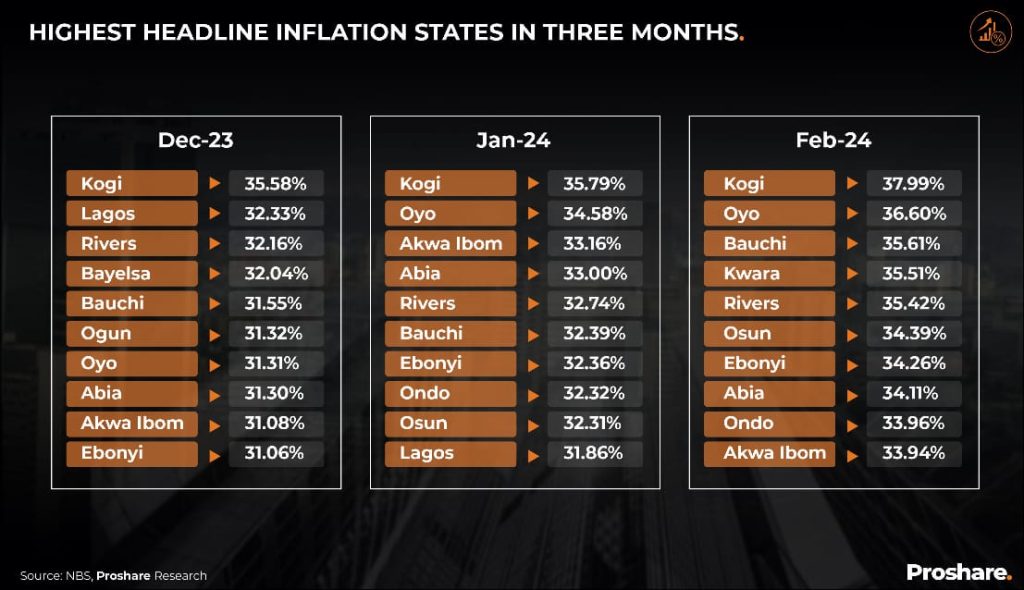
Food Inflation in Nigerian States
Kogi state has had the highest food inflation in the past three months. Kwara, Imo, Osun, Ebonyi, Akwa Ibom, Ondo, and Rivers states have appeared at least twice among the top ten states with the highest food inflation in the past three months (see illustration below).
Table 4:
Bauchi state has had the lowest food inflation in the past three months. Plateau, Taraba, Adamawa, and Bornu have been consistent on the list of states characterized by the lowest food inflation in the past three months (see illustration below).
Table 5:
Inflation Across Selected Economies
Nigeria’s inflation rate is among the highest globally (see illustration below).
Chart 3:
Closing Thoughts: So far, So long!
Addressing inflation is a battle that the CBN has committed itself to, but analysts doubt that the money market regulator has the right tools for the job. Nigeria’s inflation rate is the product of worsening foreign exchange rates, falling foreign remittances, low domestic real sector productivity and worsening security. These problems cannot be dealt with by using traditional monetary policy tactics. One economist who requested anonymity said that ‘taking a tailor’s measuring tape to plant cassava is not just queer but ineffective. The weapons of warfare must be chosen carefully because they decide who wins and who loses on the battlefield. Joseph chose a sling he was familiar with rather than the king’s heavy and unwieldy sword and helmet to fight Goliath’. He further noted that economics has long recognized the concept of an ‘impossible trinity’, meaning that choices and priorities must be decided carefully because Nigeria’s three major macroeconomic challenges of capital flows, inflation rate, and growth cannot be solved simultaneously. According to him,’ the CBN Governor may have good intentions, but raising the policy rate (MPR) from 18.75% to 22.75% will not solve the inflation problem, neither would raising the banks’ cash reserve ratio from 32.5% to 45%. The government must attract larger FX, financialize assets, and tackle internal security challenges head-on. No matter how large the hammer is, it cannot solve a problem that requires a needle and thread’ (see illustration below).
Chart 4:
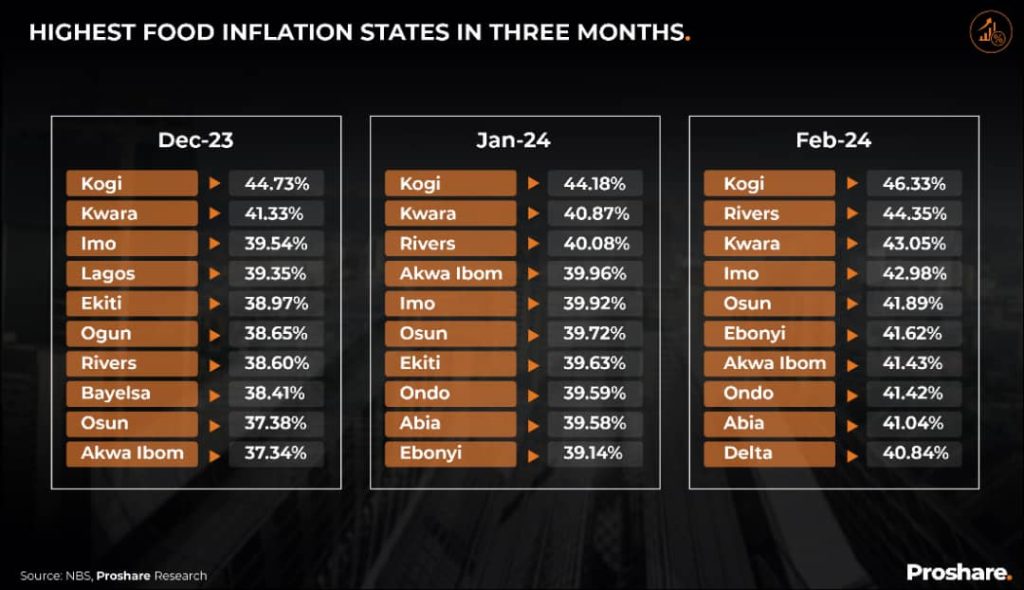
The diagram shows the classic dilemma of interest rates rising to tackle inflation and domestic GDP growth contracts. Expecting faster growth in 2024 due to higher domestic interest rates appears illusory. When cakes are eaten, they do not mystically appear to be eaten again. Once the choice of higher interest rates is taken, the consequence is economic contraction and lower employment, leading to higher social deviance. Indeed, as birds do not fly with a single wing, the federal government cannot rely only on the CBN to tackle inflation. When the distinguished economist Milton Frieman noted that ‘inflation is always and everywhere a monetary phenomenon’. He had not encountered Nigeria.
Both monetary and fiscal authorities must prioritize implementing appropriate policies to address the identified challenges, ensuring a coordinated approach. Proshare analysts advocate that in tackling the root causes of inflation, each contributing factor should be considered important. While prioritization may be necessary for the sequencing of government action, balanced attention must be given to all drivers.




